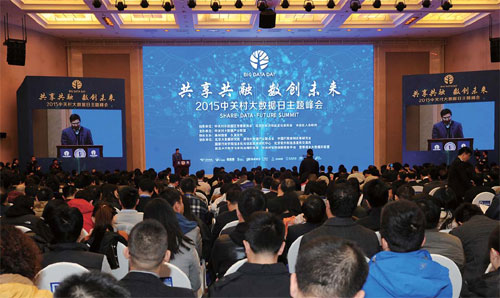Beijing sees growth in big data
Zhongguancun Science Park speeding up development of industry
Beijing is boosting its big data-related industry to promote economic and social development, said Sui Zhenjiang, vice-mayor of the city, at the 2015 Zhongguancun Big Data Day.
The event that began on Saturday attracted nearly 1,000 people to discuss development based on big data, large volume and complex data, including text, images and video, which require new forms of processing.
Sui said Beijing is planning development of the big data-related industry and measures to carry it out.
He said the Zhongguancun Science Park in Beijing has released and implemented policies to speed up development of big data industry clusters during the past years, with support from the city government.
Zhongguancun aims to become a global innovation center for big data, Sui said.
The science park is home to more than 300 companies involved in big data technology research and development as well as services, including search engine provider Baidu Inc, e-commerce company JD.com, and Beijing Xiaoju Technology Co, which runs a car-hailing mobile app named Didi Chuxing.
Sui said the companies have developed new economic forms such as a shared economy and crowdsourcing.
Cheng Wei, founder of Didi Chuxing, said his company has updated big data algorithms several times since it launched in 2012 to ensure fast and optimized matching between drivers and passengers.
According to Cheng, the future Internet will drive everything by deep computing of big data. The big data road of Didi has just begun and will continue to further facilitate life in China, Cheng said.
Zhang Pingwen, academic board director at the Beijing Institute of Big Data Research, said the institute, which was set up on Aug 27, uses Peking University's advantages in data analysis and Beijing University of Technology's big data achievements on transport and the Internet of Things to train professionals in the field and study scientific problems such as deep machine learning and natural language processing.
The two universities, along with the Zhongguancun Science Park Administrative Committee and the Haidian district government, jointly set up the institute.
The first undergraduates will finish their studies at the institute in 2017 and the organization also teaches postgraduate students, Zhang said.
Cheng said Didi Chuxing is happy to hear that news and hopes to employ students from the institute as well as cooperate with the organization.
Qi Hongwei, CEO of Datatang (Beijing) Technology Co, said his company acquires data and processes it for delivery to clients. Datatang, which was founded in September 2011, has acquired 45,000 sets of data in more than 10 fields, including transport and medical treatment, Qi said.
The company has collected and processed voice data, such as Shanghai dialects, that can be used for speech recognition.
Datatang serves big Internet companies including Baidu and Tencent as well as data-based startups, Qi said, adding that his company would probably cooperate with other participants in the event to collect data from more fields.
In August, the State Council issued an action outline to promote big data development. The document stated that further use of big data has become essential for retaining stable economic growth, improving the quality of life for Chinese people and promoting the administrative capabilities of governments.
The two-day big data event, hosted by the Zhongguancun Big Data Industry Alliance, also launched a big data development roadmap of Zhongguancun. Zhongguancun plans to attract 100 leading experts on big data, 100 startup teams and five world-class research institutes by 2020, the roadmap shows.
The Beijing-Tianjin-Hebei big data industry layout map was also released at the event. Beijing will focus on research and development of big data technology; Tianjin plans to build equipment manufacturing centers; and Chengde and Zhangjiakou in Hebei province will help store data.
The Zhongguancun Big Data Industry Alliance was set up on Dec 13, 2012, and is under the direction of the Zhongguancun administrative committee. It has 174 members across China, including 111 companies and four universities.
The Zhongguancun big data exhibition at the event showed new technologies, products and solutions from about 200 companies in the Zhongguancun big data industry chain.
songmengxing@chinadaily.com.cn
|
The Zhongguancun Big Data Day draws nearly 1,000 people to discuss development of big data, large volume and complex data. Photos provided to China Daily |



















